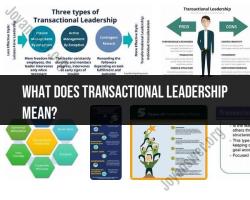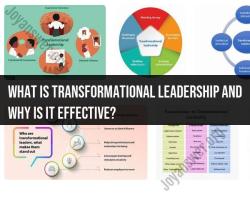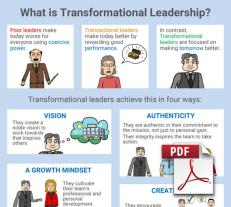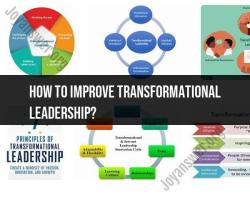What does it mean to be transformational leaders?
Transformational leaders are those who inspire and motivate their followers to achieve higher levels of performance and exceed their own expectations. They have a unique leadership style that focuses on fostering positive change, personal growth, and collective success within their teams or organizations. Here are the key characteristics and principles associated with transformational leadership:
Visionary: Transformational leaders have a clear and compelling vision of the future. They can articulate this vision in a way that inspires and engages their followers.
Inspiration: They lead by example, serving as role models for their teams. Their enthusiasm and passion are contagious, and they motivate others to commit to the vision.
Intellectual Stimulation: Transformational leaders encourage creativity, innovation, and critical thinking among their followers. They challenge the status quo and promote an environment of continuous learning.
Individualized Consideration: They take a personal interest in the development and well-being of each team member. They understand their strengths, weaknesses, and individual needs.
Empowerment: Transformational leaders empower their followers by delegating authority and allowing them to make decisions. This fosters a sense of ownership and responsibility.
Positive Reinforcement: They use positive reinforcement and constructive feedback to motivate and guide their team members. They celebrate achievements and provide support when needed.
Emotional Intelligence: Transformational leaders are emotionally intelligent, understanding and managing their own emotions and empathizing with the emotions of others.
Change Agents: They are not afraid of change and are often at the forefront of change initiatives. They help their teams adapt to change and see it as an opportunity for growth.
The impact of transformational leadership can be profound:
Increased Morale: Transformational leaders create a positive and inspiring work environment, boosting morale among team members.
Enhanced Performance: Their ability to inspire and challenge leads to higher levels of commitment and performance.
Improved Innovation: By encouraging creativity and critical thinking, transformational leaders often foster innovation and problem-solving within their teams.
Long-Term Growth: Organizations led by transformational leaders tend to experience long-term growth and adapt more effectively to changing environments.
Development of Future Leaders: They often develop and mentor future leaders within their teams and organizations.
In summary, transformational leaders are individuals who possess a set of qualities that enable them to create a compelling vision, inspire their teams, and encourage personal and collective growth. They have a significant impact on the performance and culture of their organizations.
What defines transformational leaders and their leadership style?
Transformational leaders are individuals who inspire and motivate their followers to achieve extraordinary things. They are able to create a shared vision for the future and empower their followers to take action to achieve that vision. Transformational leaders are also able to build trust and rapport with their followers, and they are committed to developing their followers' potential.
Characteristics and traits of transformational leaders in various fields
Transformational leaders share a number of common characteristics, including:
- Vision: Transformational leaders have a clear vision for the future and are able to communicate that vision to their followers.
- Passion: Transformational leaders are passionate about their work and are able to inspire others to share their passion.
- Integrity: Transformational leaders are honest and ethical, and they build trust with their followers.
- Empathy: Transformational leaders are able to understand and share the feelings of their followers.
- Intellectual stimulation: Transformational leaders challenge their followers to think critically and to come up with new ideas.
- Individual consideration: Transformational leaders treat their followers as individuals and are concerned with their development.
Transformational leaders can be found in all fields, including business, government, education, and the non-profit sector. Some examples of transformational leaders in various fields include:
- Business: Steve Jobs, Bill Gates, Elon Musk
- Government: Nelson Mandela, Mahatma Gandhi, Martin Luther King Jr.
- Education: Malala Yousafzai, Jaime Escalante, Robin Williams
- Non-profit: Mother Teresa, Bill Clinton, Bono
How do transformational leaders inspire and motivate their teams or followers?
Transformational leaders inspire and motivate their followers in a number of ways. They:
- Set a clear and inspiring vision for the future. Transformational leaders are able to communicate their vision in a way that resonates with their followers and inspires them to achieve it.
- Create a culture of trust and respect. Transformational leaders build trust with their followers by being honest and ethical, and by showing them respect.
- Empower their followers to take action. Transformational leaders give their followers the authority and resources they need to achieve the vision.
- Provide support and encouragement. Transformational leaders are there for their followers when they need them, and they provide them with the encouragement they need to keep going.
- Celebrate successes. Transformational leaders recognize and celebrate the successes of their followers, which helps to motivate them to continue to achieve.
Strategies for developing and cultivating transformational leadership skills
There are a number of things that individuals can do to develop and cultivate transformational leadership skills. These include:
- Developing a clear vision for the future. What do you want to achieve? What kind of impact do you want to have on the world?
- Learning from others. Study and learn from other transformational leaders. What are their strengths and weaknesses? How do they inspire and motivate others?
- Practicing transformational leadership behaviors. Seek out opportunities to practice transformational leadership behaviors, such as setting a clear vision, building trust, empowering others, and celebrating successes.
- Getting feedback from others. Ask for feedback from others on your transformational leadership skills. This feedback can help you to identify areas where you need to improve.
Examples of transformational leaders in history and contemporary society
There are many examples of transformational leaders in history and contemporary society. Some examples include:
- History: Nelson Mandela, Mahatma Gandhi, Martin Luther King Jr., Mother Teresa, Abraham Lincoln, Winston Churchill
- Contemporary society: Steve Jobs, Bill Gates, Elon Musk, Malala Yousafzai, Jaime Escalante, Robin Williams
Transformational leaders have made a significant impact on the world. They have inspired and motivated others to achieve great things. If you are interested in developing your transformational leadership skills, there are a number of things that you can do. You can develop a clear vision for the future, learn from others, practice transformational leadership behaviors, and get feedback from others.











